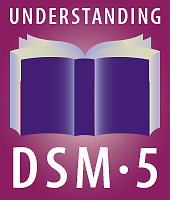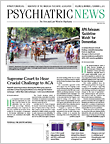A guide to DSM-5 written for patients, their families, and other members of the public who want to know more about mental illness will be published in April by American Psychiatric Publishing (APP).
Following the format and organization of the clinician’s version of DSM-5, the book, titled Understanding Mental Disorders: Your Guide to DSM-5, covers all of the mental disorders in DSM-5, explaining each in clear, concise language for laypersons. In addition to patients, families, and the general public, others who will find the book useful include nonpsychiatric health care professionals, teachers, counselors, clergy, employers—anyone who deals with people and needs to know more about mental illness and its treatment.
Each chapter includes a patient story that provides personalized illustrations of particular disorders. The book concludes with the chapter “Treatment Essentials,” which gives an overview of the treatments now available for mental illness.
“[M]ental illnesses are not a question of character; they are illnesses that can be treated,” writes former U.S. Congressman Patrick Kennedy in the book’s foreward. “And like most illnesses, mental illnesses respond best to treatments that are timely and effective. Yet often we ignore or dismiss these illnesses in their earliest, most treatable stages—and respond only when they have escalated to critical and potentially life-threatening conditions. Simply put, too few of us know the signs and symptoms of mental illnesses, and countless people suffer as a result.
“This is why Understanding Mental Disorders: Your Guide to DSM-5 makes such an important contribution,” he continues. “By translating the psychiatric profession’s most recent Diagnostic and Statistical Manual of Mental Disorders (DSM) into clear, accessible language, it empowers family members and friends to help identify individuals who might be at risk or who are already suffering from a mental disorder and need treatment. This book gives those of us with these conditions the keys to better understand our own situations.”
In comments to Psychiatric News, Robert Hales, M.D., editor in chief for books at APP, said the guide had its origins last year when APP Publisher Rebecca Rinehart convened a six-member editorial advisory panel to discuss the project. That panel included Hales; Donald Black, M.D., a professor of psychiatry at the University of Iowa Roy J. and Lucille A. Carver College of Medicine; Jeffrey Borenstein, M.D., president and chief executive officer at the Brain & Behavior Research Foundation and editor in chief of Psychiatric News; Ellen Frank, Ph.D., a professor of psychiatry and of psychology at the University of Pittsburgh School of Medicine and DSM-5 text coordinator for mood disorders; David Kupfer, M.D., the Thomas Detre Professor of Psychiatry and Professor of Clinical and Translational Science at the University of Pittsburgh School of Medicine and DSM-5 task force chair; and Susan K. Schultz, M.D., professor and vice chair for clinical translation in the Department of Psychiatry at the University of Iowa Roy J. and Lucille A. Carver College of Medicine and DSM-5 text editor.
A first draft of the book was written by Glenda Fauntleroy, a professional writer specializing in health and medical information, and each chapter was carefully edited by the members of the editorial advisory panel. The book was also reviewed by representatives of patient advocacy groups, such as the National Alliance on Mental Illness.
Hales said psychiatrists can feel confident in referring their patients and other members of the public to the book. “Educating people about mental illness is our responsibility as psychiatrists—and one of the crucial missions of APA,” Hales said. “Understanding Mental Disorders: Your Guide to DSM-5 will help us, as clinicians and as a profession, provide those who may be suffering from a mental disorder and their family members with an invaluable guide.
“Rigorously reviewed by experts with a variety of clinical perspectives, Understanding Mental Disorders presents sometimes complex information in readable, user-friendly language,” he added. “Mental health professionals can assure their patients that APA’s official manual represents the most accurate, up-to-date, evidence-based information available in the field.”
Advisory panel member Frank agreed. “This is the volume I’ve needed at least a hundred times in my career, but it didn’t exist,” she told Psychiatric News. “I’m always looking for a readable but comprehensive way of explaining mental disorders to patients and to their family members. I think it’s particularly valuable that it doesn’t just focus on one disorder.
“There are many pamphlets that do, but they don’t provide the comprehensive view that Understanding Mental Disorders: Your Guide to DSM-5 provides. This is so important because so often the ‘primary’ or ‘presenting’ diagnosis is not the only problem and sometimes not even the most important problem in terms of an individual’s function. Understanding Mental Disorders: Your Guide to DSM-5 gives the reader the opportunity to try to understand what else might be going on.” ■
Understanding Mental Disorders: Your Guide to DSM-5 may be preordered from American Psychiatric Publishing
here. APA members can purchase the book at a discount.

